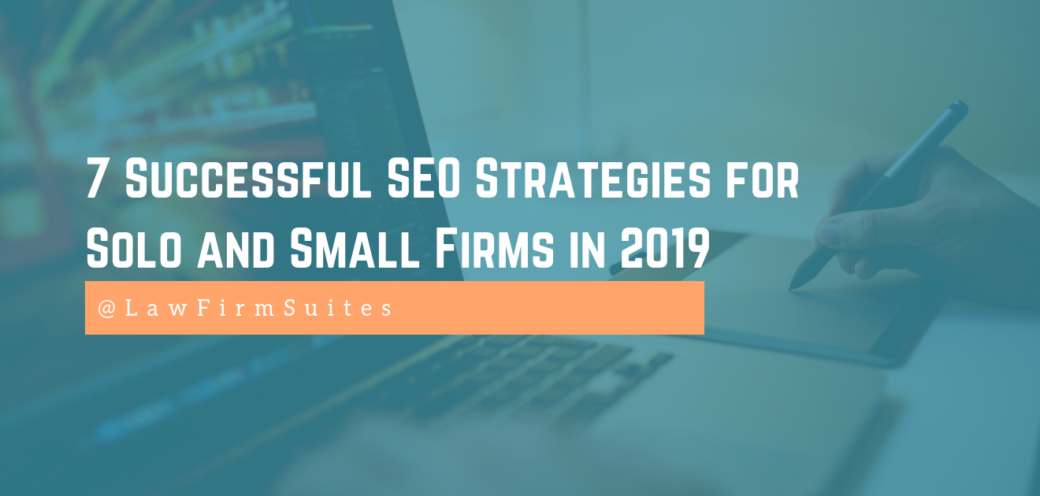Solo and small firm lawyers are busier than ever, follow these quick and simple SEO tips to improve your marketing and rank above your competition online.
Nowadays, every business is aiming for a strong online presence. Making the legal services market very competitive because most lawyers are going after the same audiences.
However, at the same time, since there is so much competition, it can be difficult for potential clients to know which lawyer to pick. This is where search engine optimization (SEO) for legal services comes into play.
SEO helps to make it easier for potential clients to find you online. This is because, if done successfully, a good SEO strategy will help your firm’s website to rank at the top of search results.
If you feel overwhelmed by the technical details and requirements for SEO, you are not alone. It’s difficult for solo and small firm lawyers to find the time to get everything done. That is why we have put together this list of SEO strategies that will help you to quickly and successfully boost your firm’s SEO efforts.
1. Long-Form Content Is King
Then more words the merrier! If you can write blog articles or web pages in general with at least 1,000 words then you will be on the right track to appeasing the SEO algorithms. Google prioritizes pages that are long, authoritative and offer readers detailed information. Consider incorporating long-form content on these types of site pages:
- FAQs
- Attorney profile page
- Blog articles
- About page
- Legal updates
2. Optimize Your Google My Business (GMB) Listing
When you search for a local business, you can see a list of businesses with their phone numbers, addresses, and other details at the top. The data in this local search result comes from a business’s Google My Business (GMB) listing.
GMB Signals with a 25.12% share is the number one local pack/finder ranking factor. Apart from generating web traffic, it also allows your customers to locate your law firm on Maps or book an appointment. This means you need to set up and optimize your GMB page immediately.
Here is what you should do:
- Make sure to list your GMB page in the right service category.
- You need to claim the physical location of your law firm on Maps. Also, add your complete address on the GMB page, and be sure it is identical to the one listed on your website/landing pages.
- Include your phone number and website link.
- Ensure to write a detailed and keyword-rich description. Further, use relevant keywords in the title. However, avoid keyword stuffing as it goes against Google’s keyword usage policy.
- Make use of the GMB Posts feature to interact with your target audience. You can create short and to-the-point posts to share information, events or offers with your prospects.
3. Get Published
Never underestimate the value of reaching out to publications and getting published. Google loves backlinks and if you can get them from publications with lots of credibility and great site authority, that backlink will share some of that credibility with you! Thus boosting your firm’s search ratings. Offer to do guest blog appearances on other sites, or ask your attorneys to contribute, which helps to establish your firm as an authority in the field.
4. Make Sure Your NAP Is Consistent
It’s critical to remember that the Google algorithm only knows what you tell it. Let visitors know who you are, where you are, and how to get in touch with you by providing your name, address, and phone number (NAP).
NAP is somewhat unique in that it’s the only instance where your site benefits from duplicate content on each page. For all other instances, duplicate content is a signal that a given web page lacks originality.
The most important part of NAP is to remain consistent because consistency provides credibility. For example, if you have “Suite 300” on one page, don’t write “Ste. 300” on another.
Something as simple as a misplaced hyphen could have a major impact. Tools like Yext or Localeze can help you track down these listings.
5. Mobile Friendly Site
Most people now search on a mobile device versus on a desktop, so it’s more important than ever that your site is mobile friendly. Also, recent Google algorithm updates give rank priority to mobile-friendly sites and will penalize sites that are not optimized for mobile.
The two things to look for when determining mobile friendliness is speed and how well the site displays. If you have a WordPress site there are several plugins that can make your site is mobile friendly and check page speed. Other website building tools such as Wix or Squarespace will automatically configure your site to be mobile friendly.
6. Add SSL Certificates
When websites install SSL (secure sockets layer) certificates, it ensures that visitor’s secure and sensitive data is safeguarded. Most anti-spam software will not show sites that do not have SSL protection. Having this extra protective layer also gives sites a slight boost in Google rankings.
7. Actively Pursue Reviews
Everyone knows how important online reviews are in purchasing decisions these days. A 2017 study found that 97% of consumers read online reviews prior to interacting with a local business. Google is well aware of this concept. A local business review is extremely valuable and can heavily impact your rankings. In an ultra-specialized industry like law, reviews can make or break your business.
Obviously, the more positive reviews you have, the better rankings you will receive. Pursuing reviews can always be a bit worrisome, as you don’t have control over what is said. This is why you need to commit to providing clients with the best possible experience every time.


